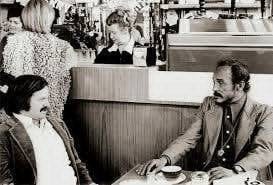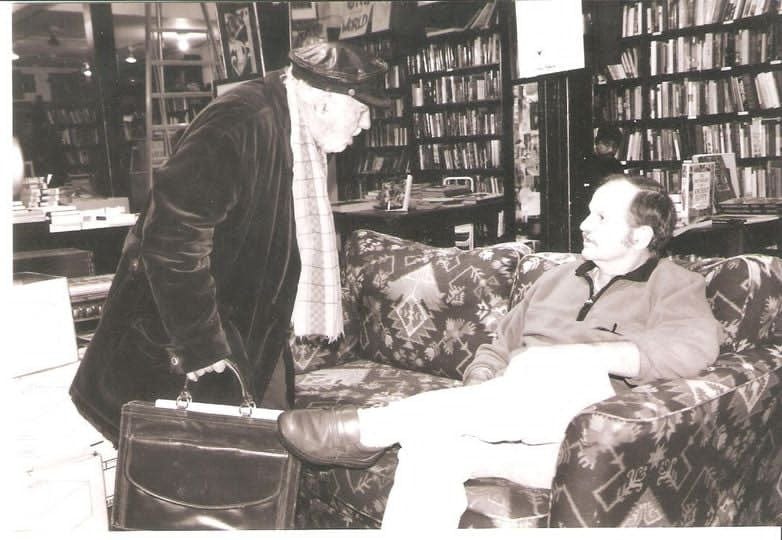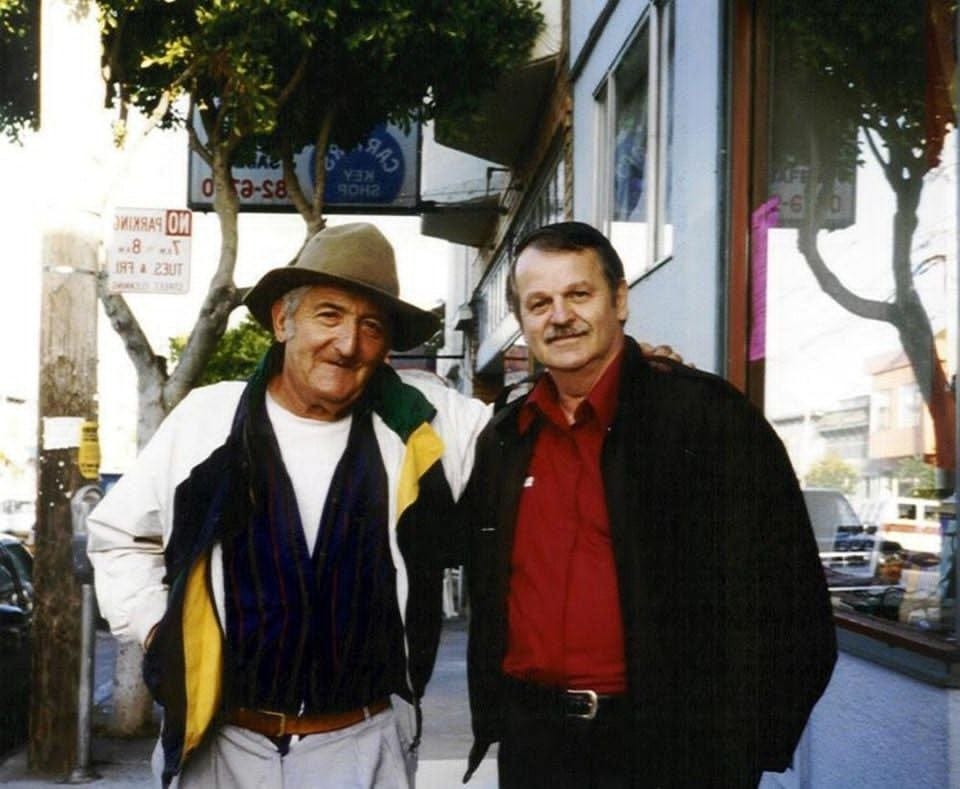Last month, we ran the first part of an article on A.D. Winans, great North Beach poet, enduring survivor of the Beat Generation and still a familiar figure in the bars and cafes of San Francisco. Our man on the street, our eye on the beat, ANTONIO PINEDA is back with the concluding essay on his hero with a cast list again populated by the writers and musicians, filmmakers and artists, who formed such a dynamic creative community in this bustling bohemian enclave. The author of this piece even signs off with a verse tribute of his own…
By Antonio Pineda
THE DUBLINER Bar in Noe Valley is a haunt frequented by A.D. ‘Al’ Winans. The venue exudes a friendly neighborhood ambiance and he and poet-writer Paul Fericano meet there on first Friday of every month to share a pint and reflect on cabbages and kings. Al is renowned as a neighborhood star, interacting with the community. you
Poet Winans, whose work has appeared in over 1,500 literary anthologies and magazines, reflects thus: ‘An early influence on me was Lawrence Ferlinghetti. I was deeply influenced by his volume of poems, A Coney Island of the Mind. Charles Bukowski was also a great influence. I enjoyed a seventeen-year friendship with Buk. William Carlos Williams dictum “Write like you speak” and Carl Sandburg, who wrote about the streets of Chicago, inspired me to write about my beloved streets of San Francisco.’
The Beat Generation, that important countercultural art movement, a post-war phenomenon that promoted existential reflection, lifestyle experimentation and the rejection of material values, has long shaped the thinking of Winans, now 88 years of age.
Winans has read his poetry with Bob Kaufman, Diane di Prima, Harold Norse, Ferlinghetti, Jack Micheline. ‘The Beat movement freed me from the society propaganda I was institutionalized with from childhood. My [military] experiences in Panama awoke me to the injustices of capitalism. The two forces led me to become a poet.’
Bob Kaufman was born in New Orleans on April 18th, 1925. Kaufman was a surrealist, jazz-influenced performing artist and satirist. He enjoys a large following in France where he is referred to as the ‘Black Rimbaud’, sometimes the ‘American Rimbaud’. In 1959 he founded the poetry magazine Beatitudes, a collaboration with A.D. Winans, Allen Ginsberg, William Margolis and John Kelly.
Pictured above: Winans and Bob Kaufman in Cafe Trieste, North Beach, San Francisco Photograph, courtesy A.D. Winans
Like Winans, I am a native son of San Francisco. I have fond memories of Beatitudes when I was a young actor with the New Shakespeare Company, as well as Illuminations, founded by Norman Moser and his wife Hadassa. The couple were shining lights, underground beacons, much sought after for their literary associations and their affiliations with the scenes around North Beach and later Haight Ashbury.
Kaufman was the undeclared poet laureate of North Beach. He held sway at the Co-Existence Bagel Shop, a venue on Green Street frequented by poetry lovers, far and near, to dig his cool readings. Winans observes: ‘The bebop poet soon became the target of a racist SFPD officer called William Bigarini. I went to High School with WB, and Kaufman became a marked man when he inscribed on the wall of the Bagel Shop, “Hitler got tired of fucking Eva Braun so he moved to San Francisco.”’
Winans contends: ‘Bigarini arrested Bob many times and he was taken to the Hall of Justice, where he was beaten with night sticks. In later years he was afflicted by drugs and given Electro Shock Treatment in New York’s Bellevue Hospital which deteriorated his health and mentality.‘
The co-founder of my former commune at 625 Ashbury Street #11, former Living Theater actor Pete Chuckwagon Brown recalls: ‘I was strolling through Washington Square. I came upon a gaggle of cops headed by Bigarini physically harassing Kaufman.
‘Bigarini was infamous in our commune, as was undercover narcotics agent Billy Morrow, who busted our commune and arrested poet Antonio Pineda. I approached the cops and shouted to them to cease and desist, that Kaufman was an important Beat poet. I was immediately grabbed by two cops who dragged me away from the fracas, one kicked me in the ass and the other told me to hit the road.’
Pictured above: Harold Norse and Winans in Abandoned Planet Bookstore, San Francisco, in the 1990s Photograph, courtesy A.D. Winans
Winans comments: ‘Bigarini went off on me once, then he switched his attention to somebody else. By this time he had been transferred to a new beat. The venue was Kezar Bar opposite the old stadium where the SF 49ers used to play.’
Another significant Beat poet Michael McClure confided to me at his crib on Downey Street, located opposite the pad of George Hunter, psychedelic Edwardian Cowboy and founder of seminal rock band the Charlatans founder. McClure reflected you: ‘Kaufman was misunderstood and marginalized by society and the police. He was one of the most talented poets of his generation. Beat culture was mostly a white phenomenon and Kaufman in his lifetime never achieved the distinction he deserved.’
I ran into Bob frequently in North Beach during my tenure with Straight Theater, opposite the Savoy Tivoli, Caffe Trieste or the Saloon. He had taken a vow of silence in 1963 against the Vietnam War. When the conflict ended he relinquished his vow.
Winans recalls, ‘I was at Specs when Kaufman broke his vow after the war ended. He began reciting from memory the works of Blake, T.S. Eliot and other grandmasters. I stayed behind after he left and penned a poem for him on cocktail napkins. The next day I posted it in a glass case on the wall in Specs. It remained on display there for over a decade.’
Billy Woodberry, a black indie director who emerged from a cinema movement entitled the LA Rebellion, shot a documentary tribute to Kaufman entitled And When I Die, I Won’t Stay Dead. The film was screened at the San Francisco International Film Festival and similar such events in Los Angeles and New York. The director interviews Winans in the documentary for a compelling view of the life and times of a great American poet excluded from the mainstream.
Writer Michael Limnios details a charming story about Gregory Corso and Kaufman in an interview. Winans the raconteur shares his anecdote. ‘I was having a drink at 1232 Club one balmy afternoon, Corso was in the back room holding court trying to impress a small group of admirers, rattling off the names of major and minor poets. Not surprisingly, he declared Ginsberg and himself as major poets, and relegated Micheline and Kaufman to minor poets.’
He was unaware that Kaufman had entered the bar and was standing in the doorway listening to the conversation. ‘I turned and asked Bob how he would rate Corso. He flashed a wide smile and said, “Major-Minor”, inciting the bar to wild applause.’
Winans pontificates on his dear friend poet Jack Micheline: ‘You can find intimate information on my friendship with Jack Micheline in my memoir Dead Lions published by Punk Hostage Press.’
The poet segues into overdrive. ‘Jack was the living definition of street poet, a title that disappeared when he died on February 27th, 1998.’
Micheline grew up on the fringes of poverty. He made his name in New York and the streets of North Beach. He saw the Beat Generation as a media fantasy that had little to do with the creative spirit.
He hung out in New York City’s Greenwich Village where he met Langston Hughes, poet emeritus of the Harlem Renaissance, at the Cedar Tavern. Winans explains: ‘The venue was a hangout for the intelligentsia and cognoscenti and Jack met Kerouac and jazz great Charles Mingus there.’
Pictured above: Jack Micheline with Winans, Bernal Heights, San Ftancisco Photograph, courtesy A.D. Winans
He further reminisces, ‘In 1957, Micheline was awarded the “Revolt in Literature”, award presented to him by Mingus. The two of them would become lifetime friends and would perform together at the California Hall in San Francisco in the seventies.’
Micheline looms large in legend. ‘Jack read his poetry at many venues in San Francisco, out of state and abroad. Like many other Beats he was influenced by jazz, and read his poetry to music by saxophonist Bob Feldman.’
He discourses, too, on his powers as a publisher. ‘Jack was loyal to his friends, but was often brash and outspoken, gaining him many literary enemies. This cost him publications in many circles. I published his only US collection of short stories, Skinny Dynamite, and Jack frequently appeared in my magazine Second Coming. He was a powerful performer who was able to hold an audience captive.’
Al also recalls a historic moment in San Francisco’s annals. ‘After Micheline passed I submitted a proposal to the Board of Supervisors to name a city street after Jack. It took nearly three years but Pardee Alley in North Beach was renamed Jack Micheline Way. He joins Jack Kerouac, Kenneth Rexroth and Bob Kaufman as being honored by the city with streets named after them.’
Kerouac said, on his historic Readings album on Verve Records, ‘Jazz is the wild music of America.’ Alongside the two Jacks, there were many more poets inspired by jazz: Kenneth Rexroth, described as ‘Father of the Beats’ by Time Magazine, Neal Cassady, Kenneth Patchen, Bob Kaufman, Gregory Corso, Allen Ginsberg, David Meltzer, ruth weiss, LeRoi Jones and Ferlinghetti to name some important examples.
San Francisco resident and Ginsberg biographer Jonah Raskin revealed recently that McClure’s first wife Joanna was in her 90s and still writing poetry. I recall Joanna fondly when I visited them often on Downey Street. She was pretty, sensible and hospitable with their beautiful daughter Jane.
Joanna was at all the intersections of the Beat movement in San Francisco and I would love to reflect on her writing, memoirs and the confluence of images and vignettes of the Beat movements in San Francisco, a golden age of poetry, prose and rock music.
Michael McClure influenced friends like the Dead, Jim Morrison and the Doors and many more bands who championed his poetic oeuvre alongside Hollywood stars Peter Fonda, Dennis Hopper, Terry Southern, author of novel-cum-film Candy and the original screenplay for Easy Rider. All of them understood the significance of his stature. Indeed, the streets of San Francisco still resonate to the importance of poets like McClure, who passed aged 87 in 2020, not to mention the great survivor Winans.
It is time surely for Winans, San Francisco’s native son deep into his ninth decade and revered among litterateurs for his connections to the Beat underground and for his passion for jazz – acclaimed now as an American classical music born of slavery, the blues and the sanctified church – to join the pantheon of poets. Thus, I live for the day, hopefully soon, when San Francisco will recognise and consecrate his accomplishments and ensure his lasting memory with a street in North Beach: Al Davis Winans Way.
CODA: A further tribute to A.D. Winans
‘Waiting for the Revolution’ by Anonio Pineda
The serpent trespassed in Eden long ago,
Mirrored in Infinity’s cosmic refraction.
Decline and loss of idealism hard and slow
Betrayed by spiritual-political inaction.
Bohemians and Intellos wait for the revolution
As the hoi polloi snores in apathy.
Belle-Lettrist hijacked through deception
Oil barons and military industrial complex treachery.
Free thinkers like witches are burned on funeral pyres. You
The poor await heaven to conjure a hero of freedom
As the mob overturns police cars, torches them afire.
Politicians claim it is all a misconception.
Pirate Dissidents sail to a hermetic lair:
They conspire to usurp corrupt kings,
to steal jewels, blue bloods to impair.
He is near, listen as the Centaur sings.
The Minotaur will ravage and devour
Those who plunge earth into rot and decay.
Labyrinth of lies stripped of power,
The time has come for the devil to pay.
Waiting for the poet to lead them from wilderness,
To unfetter the chains of nationalism and religion.
Long live the Beat and evolution.
Waiting for the truth and revolution.
See also: ‘A.D. Winans #1: Bay bard, poetic survivor’, July 27th, 2024







I edited Winans book ‘Dead Lions’ for PHP, it was a great experience, some of it had appeared before in other publications, but it was like going thru a crash course in a historical period with one of the active drivers of the history who is giving a poetic account of authors who are no longer with us as they observed the authors in creative day to day works as they happened…